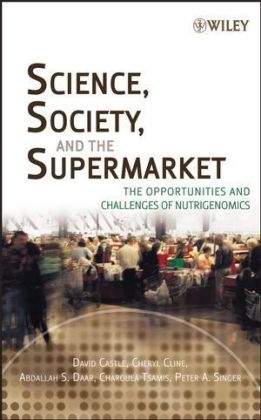
Science, Society, and the Supermarket
Wiley-Interscience (Verlag)
978-0-471-77000-8 (ISBN)
The new science of nutrigenomics and its ethical and societal challenges
Gene-diet interactions--which underlie relatively benign lactose intolerance to life-threatening conditions such as cardiovascular disease--have long been known. But until now, scientists lacked the tools to fully understand the underlying mechanisms that cause these conditions. In recent years, however, strides in human genomics and the nutritional sciences have allowed for the advancement of a new science--dubbed nutrigenomics. Although this science may lead to personalized nutrition and dietary recommendations that can mitigate, prevent, or cure sickness, current oversight mechanisms and regulations for emerging direct-to-public nutrigenomic tests are still in their infancy.
Science, Society, and the Supermarket: The Opportunities and Challenges of Nutrigenomics discusses the many ethical, legal, and social challenges presented by nutrigenomics. Concerning itself with the basic uses of nutrigenomic research as well as its clinical and commercial aspects, this text sheds light on such issues as:
* Opportunities and challenges for nutrigenomics
* The science of nutrigenomics
* The ethics of nutrigenomic tests and information both in a clinical setting and by private third parties
* Alternatives for nutrigenomics service delivery
* Nutrigenomics and the regulation of health claims for foods and drugs
* Equity and access to nutrigenomics in industrialized and developing countries
* Intellectual property issues
By taking a proactive bioethical stance on the subject, Science, Society, and the Supermarket offers a thorough and timely analysis on both the benefits and risks of nutrigenomics. Along with a thought-provoking examination of the issues, this book provides ethical guidelines and recommendations for further study in policy and regulatory development.
David Castle, PhD, is Associate Professor in the Department of Philosophy at the University of Ottawa, Ontario, Canada. Cheryl Cline, PhD, received her doctorate in philosophy from the University of Toronto in 2005. Her dissertation focused on animal welfare issues at the intersection of ethics, law, and politics. Abdallah S. Daar, MD, DPhil, is Professor of Public Health Sciences and Professor of Surgery, and Director of Ethics and Policy at the McLaughlin Centre for Molecular Medicine, University of Toronto. Charoula Tsamis is a research assistant at the Joint Centre for Bioethics, University of Toronto. Peter A. Singer, MD, is a Professor of Medicine at the University of Toronto and University Health Network, and a Senior Scientist at the McLaughlin Centre for Molecular Medicine, University of Toronto.
Preface. Acknowledgments.
1 NUTRITIONAL GENOMICS: OPPORTUNITIES AND CHALLENGES.
1.1 Introduction.
1.2 What is Nutritional Genomics?
1.3 Methodology and Approach of this Book.
1.4 Opportunities and Challenges for Nutrigenomics.
1.4.1 Improved health.
1.4.2 Personalized dietary advice.
1.4.3 Improved diet.
1.4.4 More development of health-enhancing food products.
1.4.5 Consumer empowerment.
1.4.6 Reducing health disparities.
1.4.7 Health care savings.
1.5 Challenges and a Road Map of This Book.
References.
2 THE SCIENCE OF NUTRIGENOMICS AND NUTRIGENETICS.
2.1 Introduction.
2.2 The Scientific Context.
2.2.1 Nutrigenomics.
2.2.2 Nutrigenetics.
2.3 The Case of MTHFR.
2.4 Room for Improvement.
2.4.1 Study design.
2.4.2 Epigenetics.
2.4.3 SNPs and haplotypes.
2.4.4 Dietary intake assessment.
2.4.5 Biomarkers.
2.4.6 Susceptibility and predictions.
2.4.7 Analytical and clinical validity.
2.4.8 Clinical utility.
2.5 Science and Technology Assessment.
2.6 Conclusion.
References.
3 THE ETHICS OF NUTRIGENOMIC TESTS AND INFORMATION.
3.1 Introduction.
3.2 Ethical Principles.
3.3 Nutrigenomics Testing in the Clinical Setting.
3.3.1 Informed consent.
3.3.2 Confidentiality.
3.3.3 Secondary information.
3.3.4 Families.
3.3.5 Genetic testing of children and adolescents.
3.4 Use of Nutrigenomics Information for Research.
3.5 Use of Nutrigenomics Information by Private Third Parties.
3.5.1 Insurance.
3.5.2 Employment.
3.5.3 Legal and social responses to fears of discrimination.
3.6 Conclusion.
References.
4 ALTERNATIVES FOR NUTRIGENOMIC SERVICE DELIVERY.
4.1 Introduction.
4.2 Considerations for Nutrigenomic Service Delivery.
4.2.1 Strength of the science.
4.2.2 Regulatory environment.
4.2.3 Human resource capacity and professional competence.
4.2.4 Funding policy.
4.2.5 Professional politics and culture.
4.2.6 Consumers and patients.
4.3 Four Alternative Models.
4.3.1 Consumer model.
4.3.2 Health practitioner model.
4.3.3 Blended models.
4.3.4 Public health model.
4.4 Conclusion.
References.
5 NUTRIGENOMICS AND THE REGULATION OF HEALTH CLAIMS FOR FOODS AND DRUGS.
5.1 Introduction.
5.1.1 Genetic tests, service delivery, and genetic antidiscrimination.
5.2 Food Categories: Functional Foods, Nutraceuticals, Medicinal Foods, and Dietary Supplements.
5.2.1 Functional foods.
5.2.2 Nutraceuticals.
5.2.3 Medical or medicinal foods.
5.2.4 Dietary supplements.
5.3 Health-Related Claims Associated with Foods Compared to Drugs.
5.3.1 Structure–function claims.
5.3.2 Health claims.
5.3.3 Medical food claims.
5.3.4 Disease risk reduction claims.
5.4 Nutrigenomic Information and the Regulation of Foods Compared to Drugs.
5.4.1 The regulation of foods.
5.4.2 The regulation of drugs.
5.5 Food and Drug Regulations in Japan, the United States, and Canada.
5.5.1 Japan.
5.5.2 United States.
5.5.3 Canada.
5.6 Conclusion.
References.
6 NUTRIGENOMICS: JUSTICE, EQUITY, AND ACCESS.
6.1 Introduction.
6.2 Industrialized Country Context.
6.2.1 Individualized nutrigenomic testing.
6.2.2 Population-based nutrigenomics.
6.3 Developing Country Context.
6.3.1 Individualized nutrigenomic testing.
6.4 Nutrigenomics and Intellectual Property.
6.4.1 An issue of access to scientific information.
6.5 Conclusion.
References.
7 CONCLUSIONS AND RECOMMENDATIONS.
7.1 Introduction.
7.1.1 Nutrigenomic science.
7.1.2 Nutrigenomics and health information management.
7.1.3 Nutrigenomic service delivery.
7.1.4 Regulation of nutrigenomics.
7.1.5 Access and equity.
7.2 A Final Word.
Index.
| Erscheint lt. Verlag | 2.1.2007 |
|---|---|
| Zusatzinfo | Charts: 4 B&W, 0 Color; Tables: 1 B&W, 0 Color; Exhibits: 24 B&W, 0 Color; Graphs: 1 B&W, 0 Color |
| Sprache | englisch |
| Maße | 164 x 236 mm |
| Gewicht | 425 g |
| Einbandart | gebunden |
| Themenwelt | Medizin / Pharmazie ► Gesundheitsfachberufe ► Diätassistenz / Ernährungsberatung |
| Studium ► 2. Studienabschnitt (Klinik) ► Humangenetik | |
| Naturwissenschaften ► Biologie ► Genetik / Molekularbiologie | |
| Weitere Fachgebiete ► Land- / Forstwirtschaft / Fischerei | |
| ISBN-10 | 0-471-77000-0 / 0471770000 |
| ISBN-13 | 978-0-471-77000-8 / 9780471770008 |
| Zustand | Neuware |
| Informationen gemäß Produktsicherheitsverordnung (GPSR) | |
| Haben Sie eine Frage zum Produkt? |
aus dem Bereich


